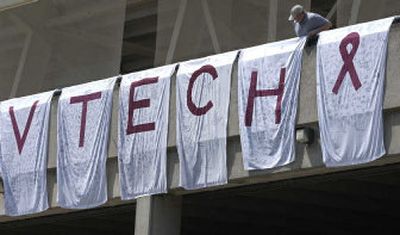‘A crying shame’

BLACKSBURG, Va. — When Fred McChesney heard about the Virginia Tech shooting spree on April 16, he was appalled. But what he did next has appalled many others.
Within hours of the rampage, the Phoenix man began buying dozens of domain names — CampusKillings.com, VirginiaTechMurders.com, SlaughterInVirginia.com — in hopes of selling them later to the highest bidder.
McChesney, 48, said he saw it as an opportunity to show his contempt for firearms by featuring anti-gun content on the domains he is selling.
He also saw it as an opportunity to cash in.
“Everyone is profiting off of this,” McChesney said. “I’m not hurting anyone.”
Domain names related to the tragedy were snapped up almost immediately by people hoping to sell them off for a profit or use them to link to advertisers. The cost of registering such domains is generally less than $10 — but some are now being auctioned off for thousands.
While many consider the practice repellent, experts say it has become commonplace.
“Any time there’s a big news event, people go register the domain names,” said Christine Jones, general counsel for GoDaddy.com, the world’s largest domain registration service. “Nine-eleven they did it, Katrina they did it, the tsunami in southeast Asia they did it.”
Especially troubling to some is the registration of domain names related to those killed in the tragedy. On the same day the victims’ names were released, people began registering domains named after the dead, such as JarrettLane.com. Victims’ friends and family members seeking to create a memorial site under the same Internet address would then have to purchase it from the domain name owner — for whatever price the owner wants.
“If anybody is working to make a profit off of this tragedy by selling these kinds of things, it’s just a crying shame,” university spokesman Mark Owczarski said. “Obviously, you wouldn’t want anybody to make a profit off something as horrendous as this.”
Jeremiah Johnston, chief operating officer for domain name broker Sedo.com, said his company has shut down domains named after the victims as well as dozens of others related to the tragedy.
“We do feel that they fly in the face of our offensive domain policy,” Johnston said. “It is quite tasteless.”
GoDaddy.com shut down one site purporting to raise money for the victims’ families after university officials said they weren’t aware of any such charity, Jones said.
But in general, there are few restrictions on what people can register. The Internet’s key oversight agency, the Internet Corporation for Assigned Names and Numbers, has arbitration procedures for resolving disputes, but they cover only trademarks and service marks, which can include names of celebrities. Federal laws also focus on trademark owners, not the names of non-famous individuals such as the victims.
“It’s kind of exploitative, but it’s not really cybersquatting,” University of South Carolina cyberspace law professor Ann Bartow said. “It’s socially, normatively disgusting, but it’s not trademark bad faith.”